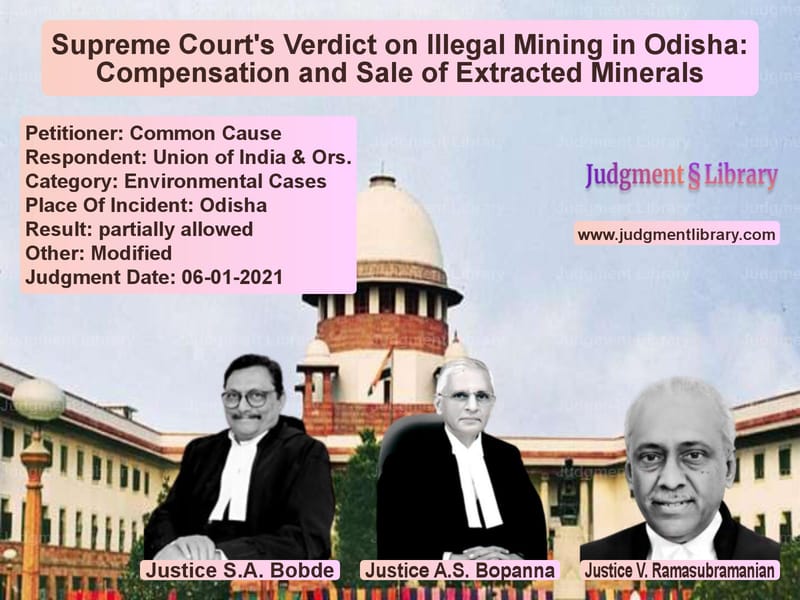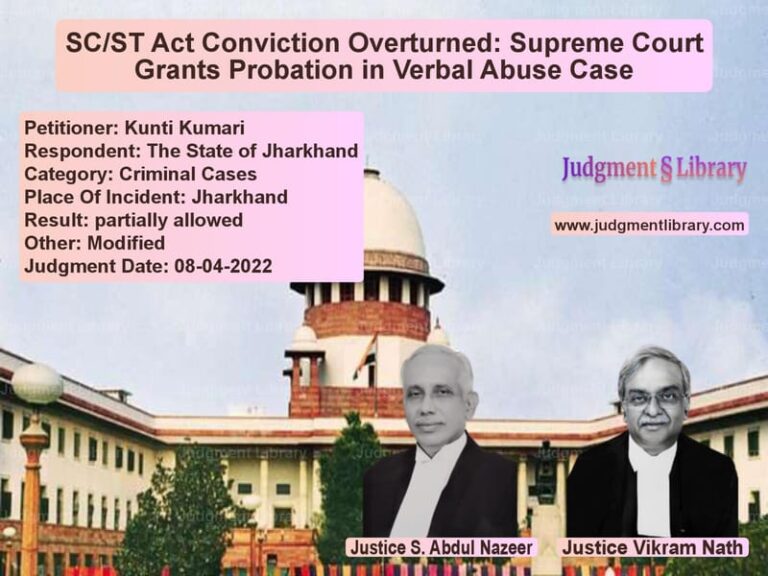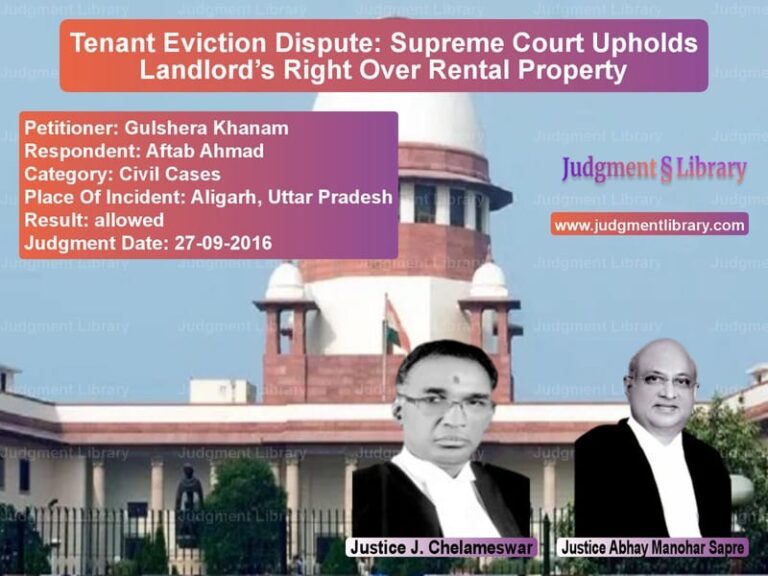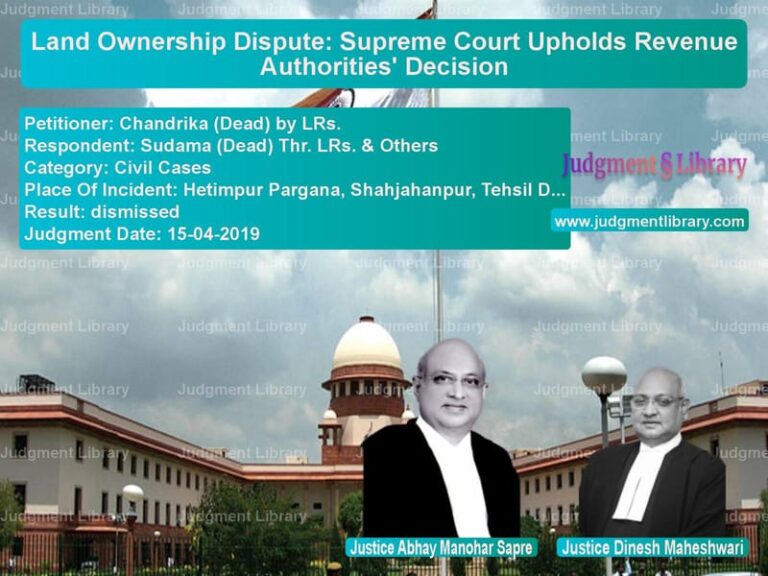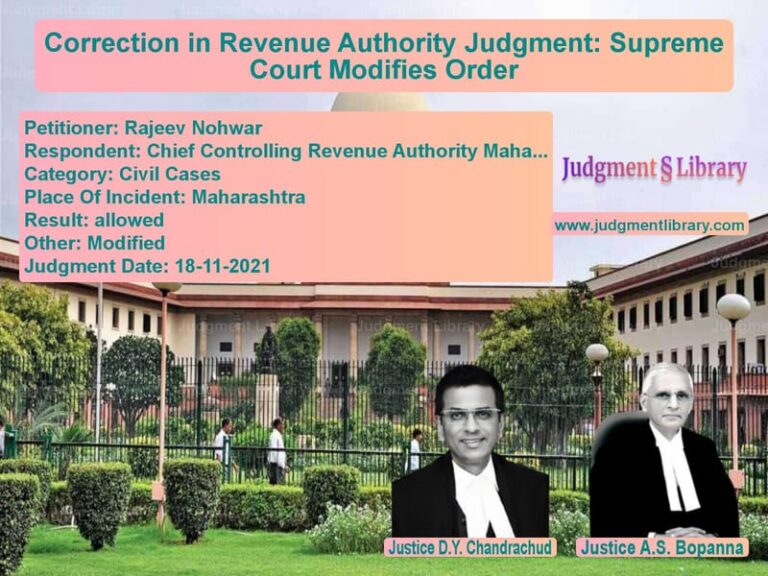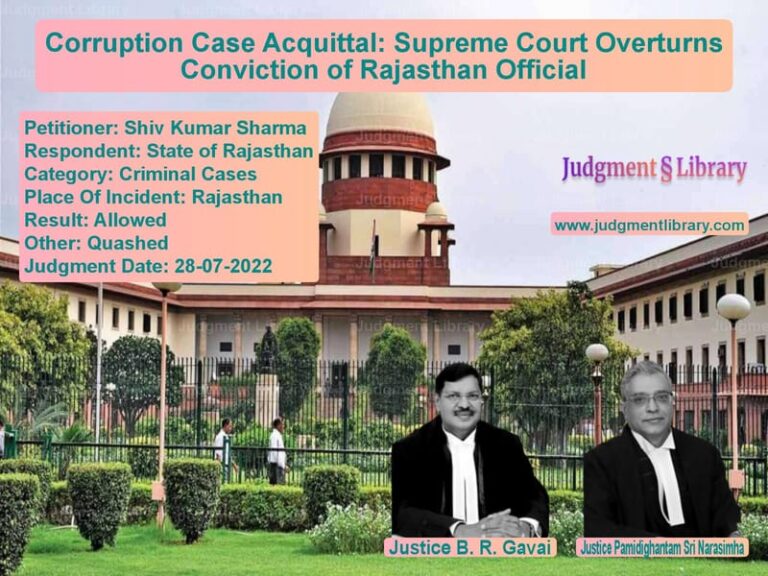Supreme Court’s Verdict on Illegal Mining in Odisha: Compensation and Sale of Extracted Minerals
The Supreme Court of India, in the case of Common Cause vs. Union of India & Ors., addressed large-scale illegal mining operations in Odisha. The judgment, delivered on January 6, 2021, dealt with multiple applications concerning the sale of already mined mineral stocks and compensation payments for excess production. This case highlights the court’s approach to handling illegal mining, ensuring compensation recovery, and implementing strict oversight mechanisms.
Background of the Case
The case originated from a writ petition filed by Common Cause, a non-governmental organization, bringing to light the rampant illegal mining in Odisha. Mining leaseholders were accused of exceeding their permissible extraction limits without obtaining proper environmental and statutory clearances, violating the Mines and Minerals (Development and Regulation) Act, 1957 (MMDR Act). The Supreme Court had earlier ruled that excess mining beyond approved limits constituted illegal activity and required compensation under Section 21(5) of the MMDR Act.
The central issues in this case included:
- Whether mining leaseholders who had exceeded their permissible extraction limits could sell the mined ore to pay the compensation due to the government.
- How the state should regulate and ensure that no further mining occurs under the guise of clearing stock.
- Whether an independent supervisory mechanism should be established to oversee the sale and proceeds.
Petitioners’ Arguments
- The petitioners argued that allowing the sale of illegally mined ore would amount to legitimizing illegal mining practices and encouraging future violations.
- They contended that leaseholders had engaged in systematic violations that depleted the natural resources of the region without obtaining the necessary environmental and statutory clearances.
- They further emphasized that allowing the sale of minerals without strict state control could encourage ongoing illegal mining, with mining firms misusing court orders.
- The petitioners urged the Court to impose stringent conditions to prevent the regularization of illegal mining.
Respondents’ Arguments
- The mining leaseholders argued that they had already paid significant amounts toward compensation and sought permission to sell the remaining stock to meet outstanding liabilities.
- The Odisha government stated that while the mining operations were illegal, allowing the sale of already mined ore under strict supervision would help recover compensation for environmental damages.
- The state also maintained that further mining operations should not be permitted under any circumstances.
- The government supported the appointment of an independent oversight committee to ensure fair conduct of the sale process.
Supreme Court’s Observations
The Supreme Court acknowledged the concerns raised by the petitioners but also considered the practical necessity of allowing leaseholders to generate funds to pay their compensation dues. The Court ruled:
“It is permissible to allow the applicant to sell the stock lying at site and to deposit the sale proceeds entirely with the Government, ensuring that no further mining activity is carried out under the cover of this order.”
Recognizing the risks associated with potential misuse of the permission granted for sale, the Supreme Court directed that an independent supervisory committee be constituted. This committee was tasked with ensuring compliance and overseeing the entire process of sale and deposit of proceeds.
The committee was to be composed of:
- Justice Bijoy Krishna Patel, Chairperson of the Odisha Human Rights Commission.
- Justice S.C. Parija, Former Judge of the Odisha High Court.
The Court further ruled:
“The sale proceeds shall be directly deposited in the treasury of the Odisha government and adjusted towards compensation liabilities.”
The Court’s directions included the following:
- All mineral stocks extracted beyond the legal limit shall be sold under the supervision of the committee.
- The sale proceeds must be deposited directly into the state treasury and adjusted against outstanding compensation.
- No further mining activity should be undertaken by any leaseholder under the pretext of clearing stock.
- The Odisha government shall ensure strict compliance with environmental regulations.
Final Judgment
The Supreme Court disposed of the applications with the following key directives:
- The already mined and stored minerals may be sold under the supervision of the appointed committee.
- The entire sale proceeds shall be credited to the state treasury and adjusted against compensation liabilities.
- No further mining operations shall be carried out under the guise of selling stored minerals.
- The Odisha government shall ensure that no fresh mining occurs without statutory approvals.
- The committee shall have the authority to intervene in case of any irregularities.
Conclusion
This ruling reinforces the principle that illegal mining cannot be legitimized. However, it provides a balanced approach to ensure compensation recovery while preventing further exploitation of natural resources. The appointment of an independent supervisory committee ensures that the sale of stored ore is conducted transparently, maintaining accountability within the mining sector.
The Supreme Court’s judgment highlights the importance of adherence to environmental laws and stringent enforcement of mining regulations. The decision sets a precedent for future cases involving illegal mining, ensuring that violators are held accountable while facilitating compensation for environmental and financial damages caused by their actions.
Petitioner Name: Common Cause.Respondent Name: Union of India & Ors..Judgment By: Justice S.A. Bobde, Justice A.S. Bopanna, Justice V. Ramasubramanian.Place Of Incident: Odisha.Judgment Date: 06-01-2021.
Don’t miss out on the full details! Download the complete judgment in PDF format below and gain valuable insights instantly!
Download Judgment: common-cause-vs-union-of-india-&-ors-supreme-court-of-india-judgment-dated-06-01-2021.pdf
Direct Downlaod Judgment: Direct downlaod this Judgment
See all petitions in Environmental Cases
See all petitions in Judgment by S. A. Bobde
See all petitions in Judgment by A. S. Bopanna
See all petitions in Judgment by V. Ramasubramanian
See all petitions in partially allowed
See all petitions in Modified
See all petitions in supreme court of India judgments January 2021
See all petitions in 2021 judgments
See all posts in Environmental Cases Category
See all allowed petitions in Environmental Cases Category
See all Dismissed petitions in Environmental Cases Category
See all partially allowed petitions in Environmental Cases Category

